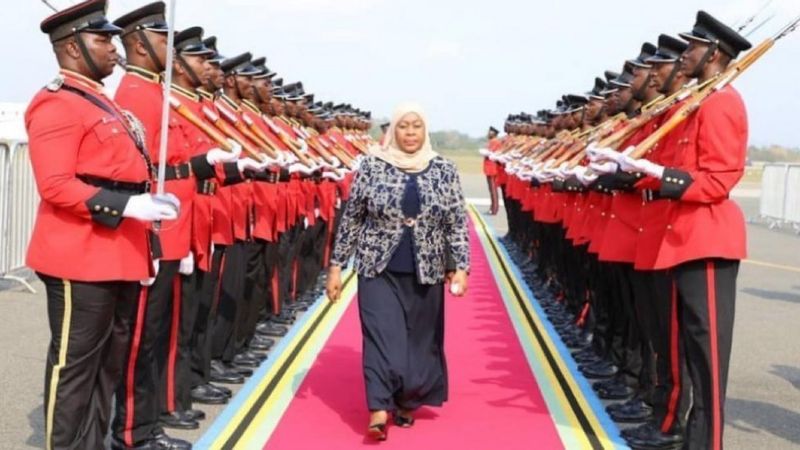Tanzania’s new president begins making positive changes
Kikonyogo Kivumbi is the executive director of the Uganda Health…

In a hopeful sign that Tanzania is changing course, the country’s new president, Samia Hassan Suluhu, has lifted a ban on media houses closed by her homophobic predecessor. She also says it’s “not proper” to ignore scientific advice about Covid-19, indicating that she’s open to changing the nation’s previous policy of Covid denial.
President Suluhu has not yet openly responded to calls by human rights groups in Tanzania and globally to reverse the serious human rights violations under the leadership of her predecessor, John Magufuli, including freeing civic space for LGBT people.
On Sunday, April 11, she is due on her first state visit to neighboring Uganda as president for talks that should culminate in the signing of oil deals, according to a top official of Uganda’s Ministry of Foreign Affairs, speaking to local media.
Known variously as President Hassan, President Suluhu, President Samia and Mama Samia, she was sworn in as president on March 19, and will serve the balance of Magufuli’s second five-year term, which ends in 2025.
The global advocacy organisation Human Rights Watch on March 18 called for Tanzania to seize the opportunity to distance itself from Magufuli’s legacy of repression and human rights abuses, saying that Suluhu’s swearing in should open “a new chapter.”
Tanzanian media have reported that Suluhu said on Tuesday, April 6, it was “not proper to ignore” the coronavirus pandemic, in comments suggesting a shift from the approach of her Covid-sceptic predecessor, who downplayed the disease.
“It is not proper to ignore it. We cannot reject or accept it without any evidence from research,” Suluhu told her newly appointed permanent secretaries at a swearing-in ceremony in Dar es Salaam.
Hassan Shire, chairperson of AfricanDefenders, a network of human rights defender organisations, expressing optimism about the new regime, stating in a tweet April 6:
“We welcome the @SuluhuSamia of #Tanzania commitment to press freedom, scientific approach to #COVID-19 and open & friendly Foreign policy. @DefendDefenders & @AfricaDefenders look forward to working with her government.”
Suluhu announced that she would create an expert Covid-19 task force to advise her government, saying they would canvass global opinion on the pandemic.

In another sign of change, Suluhu also ordered an easing of restrictions on media that had been banned before she took office last month.
Suluhu ordered that officials “free” media outlets banned by her predecessor, whose administration was criticised for a heavy-handed crackdown on the press.
“We should not give any room to say that we are suppressing media freedom,” she said. “Our regulations should also be clear for every offence and their punishment. We should not use force to ban media platforms.”
No media outlets were mentioned by name, but last year Tanzania’s Daima newspaper was indefinitely banned while broadcaster Wasafi TV, and online network Kwanza TV, were handed suspensions.
The legacy of her predecessor
Magufuli, 61, had been a firm denier of the existence of Covid-19. He disregarded safeguards against protecting his country from the pandemic.
Suluhu announced his death March 17 in Dar es Salaam, saying it was due to heart complications.

In January, former U.S. Secretary of State Mike Pompeo used some of his last minutes in office to impose visa restrictions on Tanzanian officials who were “responsible for or complicit in undermining Tanzania’s October 28, 2020, general elections,” in which homosexuals were harassed and civic organisations were repressed.
Earlier the United States had banned Magufi ally Paul Makonda from visiting the country for his role in an anti-gay crackdown. The U.S. State Department said it was taking the action against Makonda “due to his involvement in gross violations of human rights, which include the flagrant denial of the right to life, liberty, or the security of persons.”
Magufuli justified his heavy-handed crackdown on homosexuals, saying cows, goats, sheep and pigs are more morally upright than homosexual human beings in consenting adult relationships.
Kikonyogo Kivumbi, the author of this article, is the executive director of the Uganda Health and Science Press Association.
Related articles:
- Hope for change in Tanzania after death of homophobic president (March 2021, 76crimes.com)
- Tanzania obstructed HIV fight, now rejects Covid-19 vaccines (
- No end in sight for Tanzania’s anti-LGBT crackdown (
- AIDS: Tanzania’s homophobia is killing people (
- Tanzania’s anti-LGBT crackdown: ‘If we won’t get services we will die’ (
- U.S. prohibits visits by anti-gay Tanzania official (
- Tanzania government disavows Monday’s anti-gay roundup (November 2018, 76crimes.com)
- EU says to review its relation with Tanzania over human rights, rule of law (November 2018, The Citizen)
- Tanzania governor wants to rid Dar es Salaam of every gay person (November 2018, Pink News)
- Thousands ‘living in fear’ after Tanzania calls on public to report gay people (October 2018, The Guardian)
- Protests surge as Tanzania jails anti-HIV lawyers; no charges (October 2017, 76crimes.com)
- In Tanzania, 13 people attending a meeting are arrested for allegedly promoting homosexuality; operations of a Global Fund SR are suspended (October 2017, Aidspan)
- Tanzania threatens to arrest all gay rights activists (June 2017, 76crimes.com)
- Global Fund-supported programs suspended amid Tanzanian government crackdown on LGBT community (March 2017, Aidspan)
- Tanzania ramps up anti-gay panic, risks HIV expansion (February 2017, 76crimes.com)
- Homophobia Explodes In Tanzania, Health Minister Threatens ‘Gay List’ (February 2017, The Advocate)
- Seeking to limit gay sex, Tanzania bans lubricants (July 2016, 76crimes.com)




